It’s easy to think that your banking transactions are secure, and to trust the measures taken by your bank to combat the various threats. If you’ve held onto that belief, you’re not entirely off base — multi-factor authentication and robust passwords offer significant protection. Nevertheless, the most reliable way to keep sensitive information secure at all times is to use a VPN for online banking.
That said, you can’t rely on just any provider to safeguard your banking transactions. While every VPN service offers some level of security, the nuances matter, and a small loophole may be all cybercriminals need to get through. And a case of your IP address leaking while you’re abroad may raise red flags.
Don’t worry — we’ve tried and tested dozens of providers to arrive at this list. Each selected VPN comes with the essential features (and more) to protect your online banking data and traffic.
Why You Need a VPN for Online Banking
Let’s face it: online banking is a godsend. No more rushing to the dusty ATM on lunch break. Just a quick tap and your latte money magically appears. The thing is, convenience usually comes with a side of risk. Especially when you’re sipping that latte on a bustling public Wi-Fi network.
Here are the reasons why a VPN connection may come in handy for online banking:
- Secure Transactions: Online transactions are prime targets for cyber threats. While bank apps offer levels of security, they may not be adequate to keep out cybercriminals looking to steal your information or funds. For instance, hackers can exploit vulnerabilities via sniffing tools, malware injections, ransomware, and more. While a banking VPN isn’t a one-in-all barrier against all forms of cyber threats, it acts as an additional layer of protection, encrypting your transaction data and shielding it from potential breaches.
- Enhanced Privacy: Ever get the feeling that someone might be peering over your digital shoulder? A VPN for banking alleviates this concern by masking your IP address, rendering you invisible to cyber snoops. This heightened privacy shield ensures your online banking activities remain confidential and shielded from prying eyes.
- Geo-restrictions: Many banks use sophisticated algorithms that analyze login attempts for unusual patterns, including location changes. If you’re abroad and repeatedly try to log into your local bank account, your actions might raise suspicion, triggering security alerts or temporary account locks. This is why, for example, many Bank of America (BofA) customers cannot use their accounts abroad.
However, when you connect to a VPN server from home, the server’s IP address conceals your real IP address. This makes it appear like you’re accessing the bank’s website or app from a familiar location.
Best VPN for Online Banking — Our Detailed List
There are scores of VPN services around today, but many of them fall short of providing the level of privacy and security required for airtight bank transactions. We know because we’ve tested dozens of them.
For banking, you want a VPN provider with:
- Ironclad privacy and security, with robust encryption, a strict no-logs policy, and more.
- VPN blocking resistance.
- Fast and reliable servers.
- User-friendly apps compatible with the major operating systems.
- Access to expert assistance.
Fortunately, the following selection of the best VPNs for banking services will simplify your decision.
1. ExpressVPN
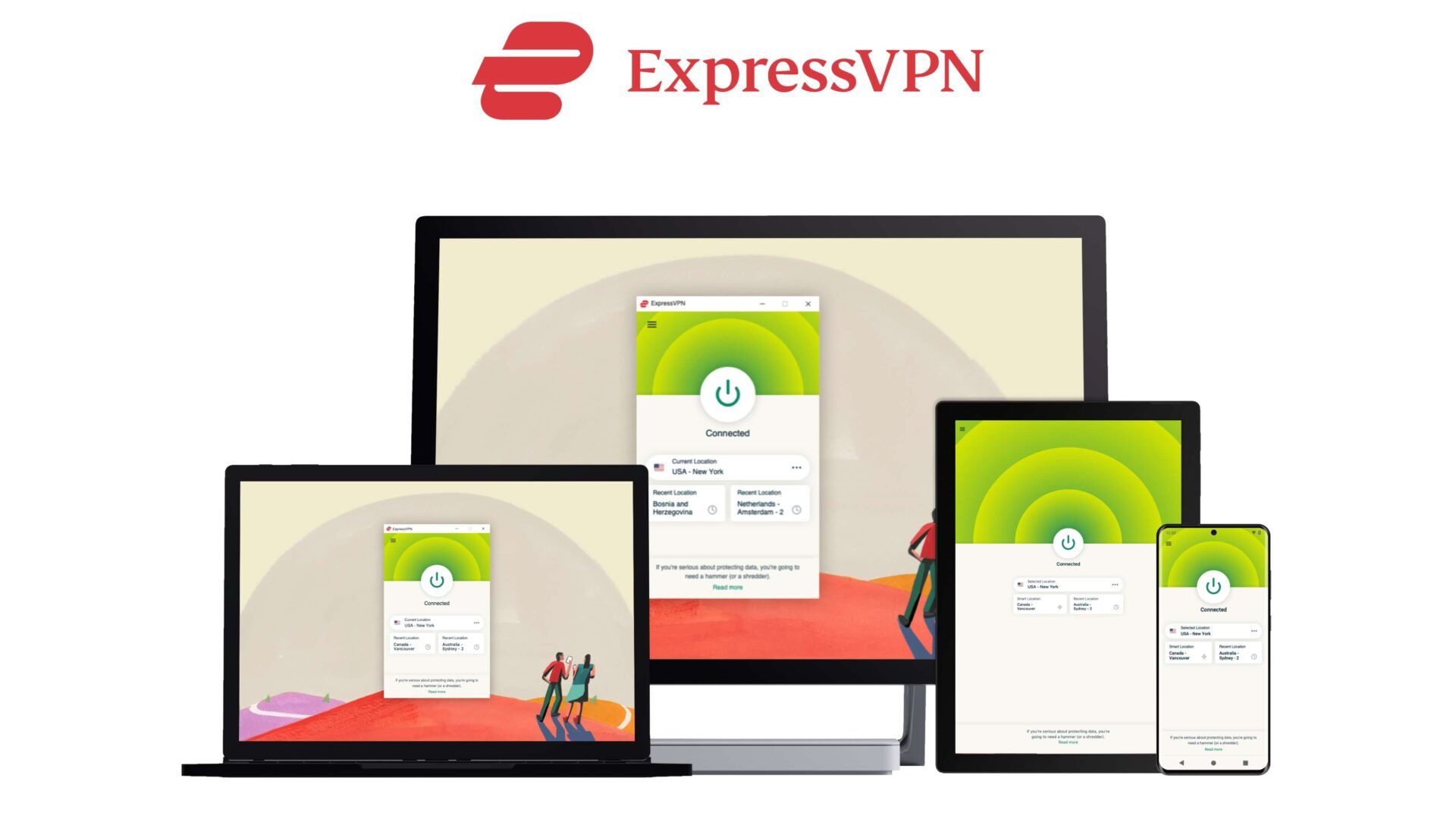
- Jurisdiction: British Virgin Islands.
- Server count: 3,000+ in 105 countries.
- Standout feature: TrustedServer technology.
- Compatibility: Windows, macOS, Linux, Android, iOS, ChromeOS, routers, browsers, gaming consoles, and more.
- Simultaneous connections: Up to 8 devices.
- Money-back guarantee: 30 days.
ExpressVPN is the ultimate VPN for protecting your online banking operations. The British Virgin Islands-based provider operates out of a data privacy-friendly jurisdiction outside the grasp of the 5/9/14 Eyes alliance of countries.
That said, there wouldn’t have been much to worry about regarding the privacy of your online traffic, thanks to the VPN’s pace-setting TrustedServer technology. ExpressVPN’s servers operate on volatile memory, which wipes clean following each reboot.
Building on that, the provider has a strict no-logs policy — it will not store identifiable logs under any circumstances, including your banking information and details of your online sessions. Third-party audits by KPMG and Cure53 have given that policy full marks.
On top of that, ExpressVPN implements military-grade AES 256-bit encryption to reduce the chances of anyone getting their hands on your data to nearly zero. If your VPN connection suddenly stops working, an effective kill switch feature swoops in to disconnect you from the internet, preventing exposure to prying eyes.
The provider has built-in obfuscation, which hides the fact that you’re using a VPN. Plus, it’s virtually impervious to VPN-blocking technology. If you decide to access your local banking service on your regular connection while keeping the VPN shield up, a handy split tunneling feature lets you handle that.
ExpressVPN is so fast you’ll forget you’re connected to a VPN server, thanks to its high-performance infrastructure and a blazing-fast custom protocol, Lightway.
You can bank online from abroad on a wide range of platforms and devices, with a single subscription protecting up to eight devices simultaneously. Customer support is available around the clock via live chat if you encounter any issues.
What’s more, a 30-day money-back guarantee backs your purchase, so you can test the best VPN for online banking risk-free.
2. NordVPN
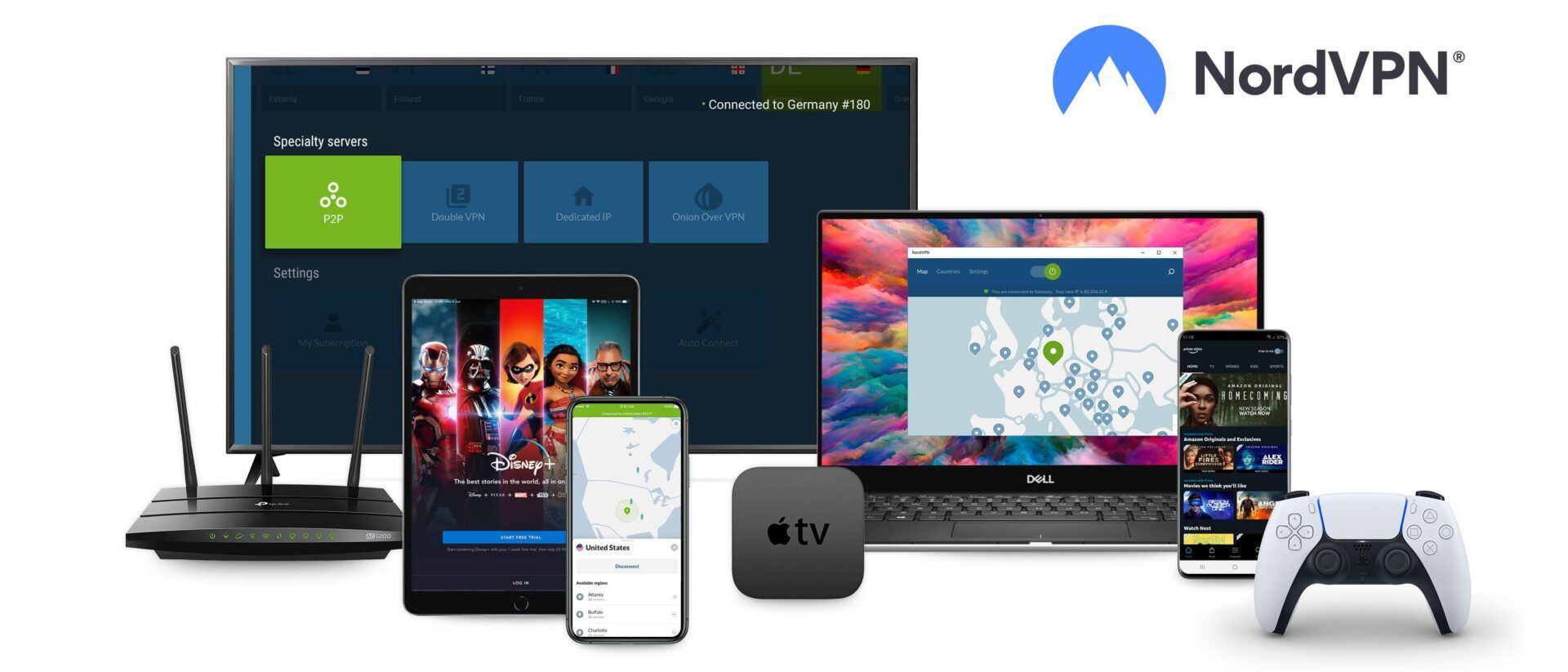
- Jurisdiction: Panama.
- Server count: 5,900+ servers in 60 countries.
- Standout feature: Custom NordLynx protocol built around WireGuard.
- Compatibility: Windows, macOS, iOS, Android, Linux, ChromeOS, routers, gaming consoles, and more.
- Simultaneous connections: Up to 6 devices.
- Money-back guarantee: 30 days.
NordVPN trails ExpressVPN on this list of the best VPN services for banking, but there’s not much to separate them. It’s a common theme.
For instance, it just misses out on the top spot in our fastest VPN selection, so you can expect lightning-fast connection speeds for your transactions.
The VPN excels across the board but strongly emphasizes security, as evidenced by its deep toolkit. As expected, AES 256-bit encryption keeps hackers and other cybercriminals out. It’s the cipher trusted by defense agencies around the world and is virtually unbreakable.
Plus, a kill switch ensures you’re protected at all times. NordVPN offers two types. The app-level version terminates specific applications, like your banking app, to prevent unintentional leaks. On the other hand, the system-wide kill switch takes no chances and shuts everything down.
NordVPN comes with several advanced features, like Double VPN servers. If you thought your connection was secure before, the extra layer the feature adds renders it impenetrable. It’s especially useful in restrictive countries, where you prefer to keep your banking and other online activities under the radar.
Like ExpressVPN, NordVPN’s Panama headquarters makes it a top choice for the privacy-focused. What’s more, the provider insists it doesn’t store usage logs of your online activities, a claim that has been thoroughly examined by PwC and Deloitte.
NordVPN is compatible with computers, smartphones, routers, and a lot more. It lets you protect up to six devices under one subscription.
The VPN’s 30-day money-back guarantee lets you see what it’s all about, risk-free. You can find all the answers you need by browsing its detailed resource base or contacting a 24/7 support team.
3. CyberGhost
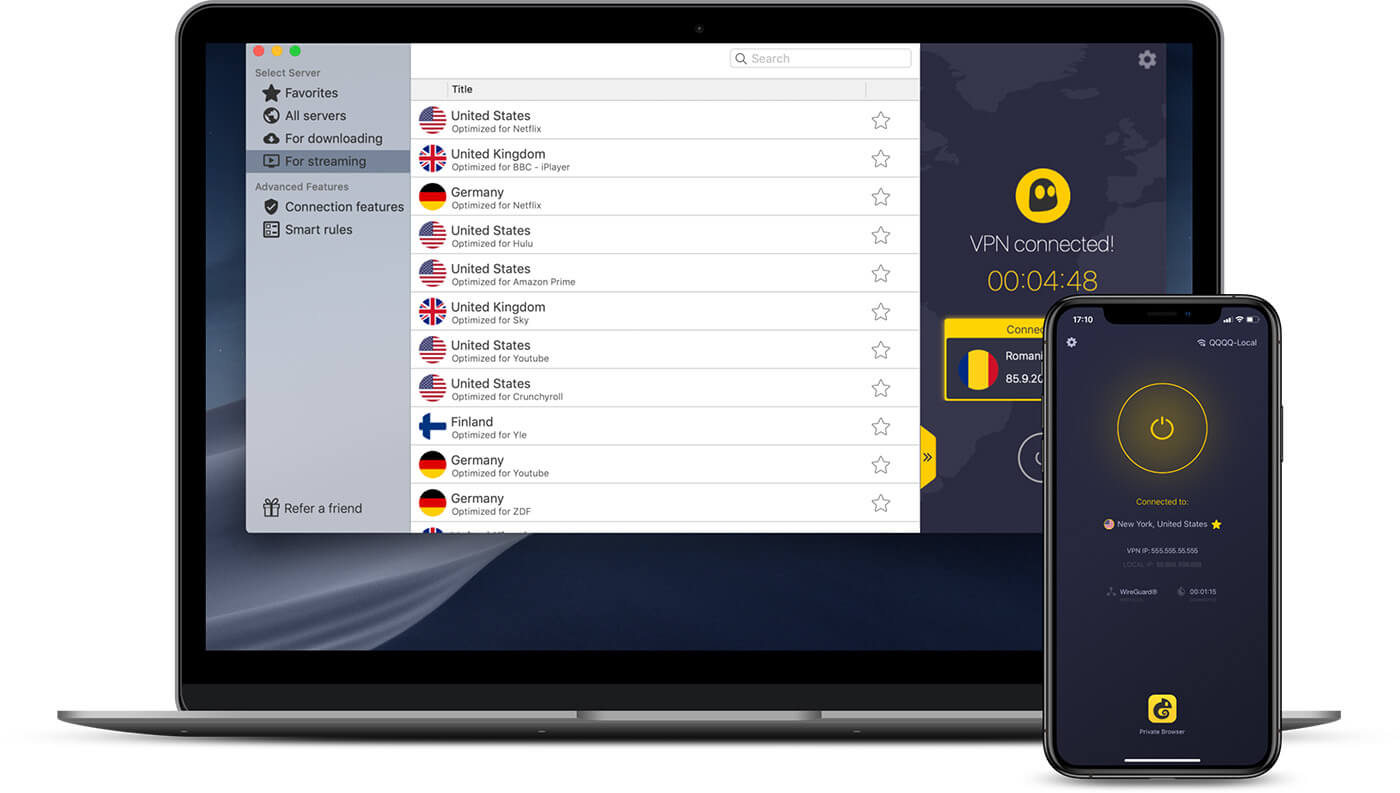
- Jurisdiction: Romania.
- Server count: 10,649 servers in 100 countries.
- Standout feature: In-house managed NoSpy servers.
- Compatibility: Windows, macOS, Linux, Android, iOS, routers, browsers, and more.
- Simultaneous connections: Up to 7 devices.
- Money-back guarantee: Up to 45 days.
CyberGhost brings much to the table and, for all that, is a wallet-friendly VPN service for online banking.
We especially like the provider’s automatic Wi-Fi protection, which you can set up under its Smart Rules feature. As the name implies, it triggers your VPN connection after detecting an unsecured public network, even if you forgot to turn on the app. That way, you’re not hopping on free Wi-Fi only to potentially fall victim to lurking malicious actors.
The VPN comes with high-level protection to prevent sensitive information from falling into the wrong hands. Activate the DNS leak protection feature, and the app plugs potentially damaging DNS leaks. Plus, it comes with a lineup of modern tunneling protocols for speed and security.
Banks keep an eye on IP addresses for security and fraud prevention purposes. CyberGhost’s dedicated IP address add-on reduces the chances of your bank detecting your VPN use and flagging your account or transactions. Not even the VPN knows what that IP is — it links it to a randomly generated token rather than your CyberChost account.
That illustrates the provider’s dedication to keeping details of your online activities to you alone, but there’s more evidence. The first VPN to launch a transparency report over a decade ago, it has maintained that tradition. Plus, Deloitte’s review of its no-logs policy showed no gaping loopholes.
CyberGhost’s confidence in its service is illustrated by its industry-leading 45-day refund policy. Unimpressed by the service within that period? You can ask for your money back.
4. Surfshark
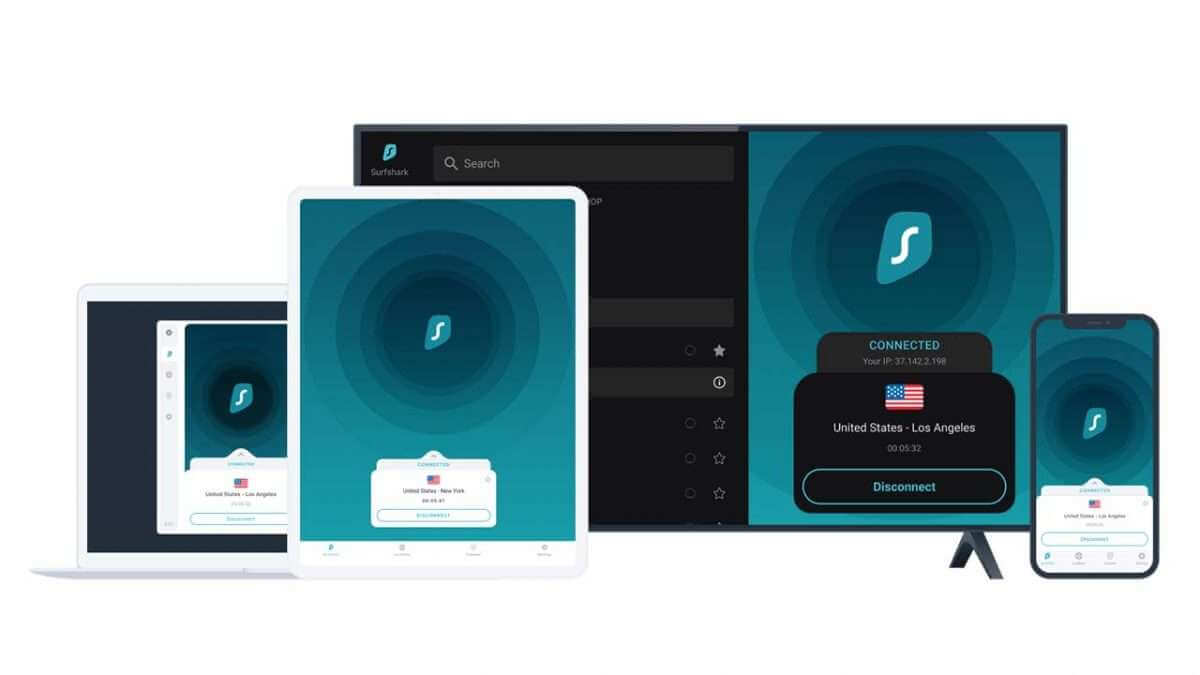
- Jurisdiction: The Netherlands.
- Server count: 3,200+ in 100 countries.
- Standout feature: Nexus with SDN technology for multiple server connections.
- Compatibility: Windows, macOS, Linux, Android, iOS, routers, browsers, and more.
- Simultaneous connections: Unlimited devices.
- Money-back guarantee: 30 days.
Surfshark is another budget option (considering longer-term plans) with much going on under the hood. The versatile provider hasn’t been around for very long but is an excellent VPN for online banking.
Camouflage Mode and NoBorders are two of its advanced features that may come in handy, especially if you’re in a restrictive environment. The former disguises your VPN traffic to look like a regular internet connection. And when you enable the latter functionality, the VPN brushes past network restrictions like they weren’t there.
Like CyberGhost, you can throw in a dedicated IP add-on so you stay connected using a unique IP address. It’s like your private VPN connection that no one else can hop on, reducing the chances of your financial institution raising eyebrows in your direction.
What’s more, while Surfshark won’t break speed records, it’s more than capable of keeping you connected without lags or interruptions. You can expect even faster connection speeds as the VPN upgrades to 10 Gbps servers across the globe.
There are no compromises on the technical side, with the banking VPN coming with end-to-end AES 256-bit cipher, a kill switch, and watertight leak protection. Surfshark’s Bypasser tool is really split tunneling and lets you decide whether or not to route your online banking traffic through the provider’s encrypted tunnel.
One subscription is enough for your needs, the number of devices in your household notwithstanding — Surfshark is one of the very few providers with no limit on simultaneous device connections. You can take the VPN for a spin, backed by its 30-day money-back guarantee.
5. Private Internet Access
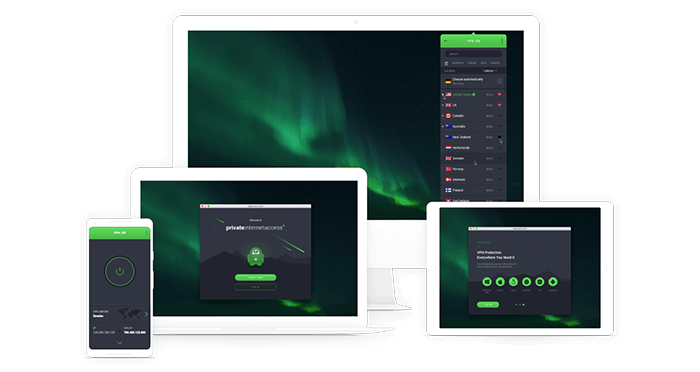
- Jurisdiction: The United States.
- Server count: Servers in 91 countries.
- Standout feature: Choice between AES 128-bit and AES 256-bit encryption.
- Compatibility: Windows, macOS, iOS, Android, Linux, routers, gaming consoles, and more.
- Simultaneous connections: Unlimited devices.
- Money-back guarantee: 30 days.
Private Internet Access secures its spot on this list of the best VPNs for banking thanks to an unwavering commitment to privacy and security.
The VPN employs RAM-based servers and upholds a strict no-logs policy, ensuring your browsing activities remain untraceable.
Ordinarily, we would have reason to take this policy with a pinch of salt, considering PIA operates from the United States, a central member of the Five Eyes alliance. That detail alone is sufficient to lower the ranking of a privacy provider several notches in our evaluation.
In PIA’s case, however, it has the opposite effect, considering the provider not only asserts its policy but has gone the extra mile to prove it, facing legal scrutiny. What’s more, it has undergone a third-party audit.
The VPN is highly customizable without sacrificing user-friendliness. For instance, you can choose between two encryption ciphers: AES 128-bit and AES 256-bit. You’ll get extremely tight security for your data from both options, with the former offering more in terms of performance.
If your VPN connection drops for whatever reason, its kill switch ensures your cover isn’t blown. Plus, PIA’s MACE is quite effective for blocking malicious ads and sites and will reduce your chances of falling for scam banking websites.
Like Surfshark, PIA is committed to keeping your online traffic private on all your devices. There’s no cap on the number of devices you can use at the same time with a single subscription.
What if you find the VPN isn’t up to the job for online banking (or anything else)? Don’t worry — you can request a refund within 30 days, no questions asked.
Other Steps to Ensure Your Online Banking Security/Privacy
A VPN is a big step in the right direction, but online banking requires a comprehensive approach to keep malicious actors on the back foot.
- Strong, unique passwords: Create complex passwords for your online banking accounts, combining uppercase and lowercase letters, numbers, and special characters. You want to avoid easily guessable information, like birthdays or names. A password manager may come in handy.
- Two-Factor Authentication (2FA): Enable 2FA for your online banking accounts. It adds an extra layer of security by requiring a second form of verification in addition to your password. That’s usually a code sent to your phone.
- Be wary of phishing attempts: Exercise caution when clicking links or opening emails, especially if they seem suspicious.
- Update relevant apps: Regularly update your device’s operating system, antivirus software, and banking apps because they include security patches to protect against vulnerabilities.
- Use secure Wi-Fi networks: Unprotected Wi-Fi connections are a hotbed for cybercriminals. Stay away unless you’re using a VPN.
How to Bank Online Safely With a VPN
Here’s how you can protect your banking activities with the help of a VPN service. You only need to follow these few steps:
1. Choose a Reliable VPN for Banking
You don’t want to go with a dud. Select a VPN provider that covers all the bases in terms of functionality and performance. Look for features like robust encryption and a strict logless policy.
We recommend ExpressVPN, but any other provider on our list of the best VPNs for online banking will do.
2. Install the App
Head over to the VPN’s official website to create an account. Choose a subscription plan that works for you and pay for it.
Afterward, download the appropriate app for your device and install it. If you need any help, you may consult guides on the website or contact a customer care representative.
3. Connect to a VPN Server
Launch the installed app and log in using your credentials. Select a VPN server depending on the bank’s location and click to connect to it.
If you wish to access your Bank of America account from abroad, you must choose a server located in the United States.
4. Bank Safely Online
With your VPN connection established, you can now carry out your banking activities safely. If necessary, you may configure the VPN’s settings to use certain advanced or extra features.
How We Selected the Best VPNs for Banking
While every VPN touts its privacy capabilities, they are not all on the same level for online banking. Some are downright terrible options to opt for.
Here’s what we looked out for while making this list:
- Robust privacy and security features: Military-grade encryption, logless policy, and everything in between. The provider must be capable of protecting your identity and personal information.
- Expansive server network: Servers in your home country will prevent red flags from popping up when you want to carry out transactions.
- Fast connection speeds: ExpressVPN-level speeds are not a non-negotiable, but your banking VPN must be speedy enough not to cause lags or delays.
- Responsive customer support: We looked out for providers with helpful customer care available around the clock.
Should You Use a Free VPN for Online Banking?
We don’t recommend you use a free VPN for online banking.
While some free VPN providers may come in handy in a pinch for changing your real IP address, most in this category are unreliable and may even be security risks.
As mentioned earlier, online banking isn’t exactly data-intensive, and a moderately fast connection will do. However, there’s no getting around the snail-slow speeds on many cost-free services due to their limited server networks and substandard infrastructure. Fewer server options also mean they may not have connection options in your home country.
On top of that, some may log your data extensively for profit — and may hand it over to authorities when requested. What’s more, essential features like a kill switch and leak protection may be lacking.
Conclusion
The best VPN for online banking should shore up security and privacy for your banking transactions and activities.
What’s more, when you’re logging into your bank app while abroad, it should prevent security alerts from rising in your direction, which could result in a suspended account.
Of the hundreds of services available, we vouch for the VPNs on this list — particularly ExpressVPN. You can take advantage of a 49% discount[comp_link] to snag an annual subscription and receive three free months in the bargain.
[comp_link id=16867 type=button]Try ExpressVPN Today